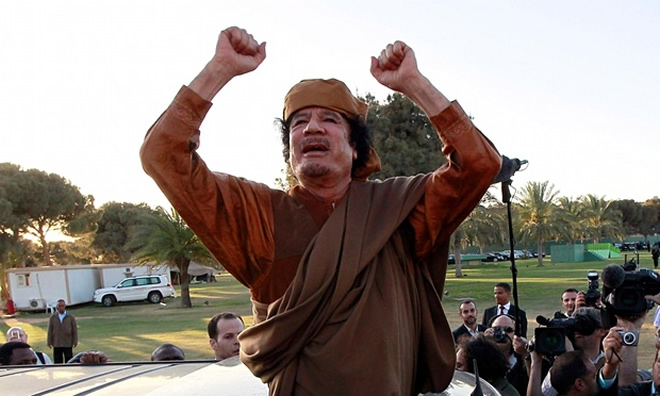
The case is based on documents recovered from Libyan government archives after the fall of Muammar Gaddafi. Photograph: Louafi Larbi/Reuters

Wednesday, July 01, 2015
Government lawyers have asked a high court judge to allow secret evidence to be presented behind closed doors in the case of five out of 12 people who allege they were kidnapped, tortured, subject to control orders or tricked into travelling to Libya where they were detained and mistreated.
The lawyers say the secret evidence would strike down the men’s claims. An attempt to have the claims struck down was rejected by the high court in January, when the judge, Mr Justice Irwin, ruled that the allegations “are of real potential public concern” and should be heard and dealt with by the courts.
Government attempts to introduce secret evidence behind closed doors represents the latest twist to a case that has been described as unprecedented. Irwin is expected to decide on Wednesday whether to grant the request.
The case is based on documents recovered from Libyan government archives after the fall of Muammar Gaddafi, including secret correspondence from MI6, MI5 reports on Libyans living in the UK, a British intelligence assessment marked “UK/Libya Eyes Only – Secret” and official Libyan minutes of meetings between the two countries’ intelligence agencies.
A team of London-based lawyers assembled the documents into an archive forming the basis of a claim for damages against the British government alleging false imprisonment, blackmail, misfeasance in public office and conspiracy to assault.
In Tuesday’s session at the high court, Thomas de la Mare QC, representing the claimants, said government lawyers were taking a “second bite at the strike-out cherry”, this time through the proposed use of secret evidence.
His argument was that the government was relying only on sensitive materials to do with the national security assessment of the claimants and not to material that relates to the safety of returning the claimants to Libya – which he said was the relevant and core issue in these claims.
Arguing for the government, Roy Phillips QC said the move to secret session would allow for the opening of the “gateway” to sensitive material in support of the state.
According to the documents discovered after the fall of Gaddafi, five men were subjected to control orders on the basis of intelligence assessments that are now alleged to have been based in part on information extracted during Libyan interrogation of the two opposition leaders, Sami al-Saadi and Abdel Hakim Belhaj, following UK-Libyan rendition operations.
Lawyers who represented the men subjected to control orders say that both the high court and the Special Immigration Appeal Commission (Siac) were kept in the dark about the UK’s role in the kidnap of the two men who were providing the information about their clients.
Following a rapprochement between the UK and Libya that began in 1999, the British and Libyan intelligence services cooperated in targeting Gaddafi opponents who had been granted exile in Britain and elsewhere.
The men were members of the Libyan Islamic Fighting Group (LIFG), an Islamist organisation that had attempted to assassinate the Libyan leader three times since its foundation in the early 90s, but largely a spent force by late 90s.
According to the claim being brought against the British government, in late 2005, a British citizen of Somali origin and a Libyan living in Ireland were arrested in Saudi Arabia and allegedly tortured while being questioned by Saudi intelligence officers about associates who were members of the LIFG.
The claims on behalf of the 12 were begun with a letter in September 2012 and then formally in January 2013, but the substantive case has yet to start as government lawyers have sought to strike down the claims before getting to the heart of the allegations.
According to the government, the claims are an abuse of process as the men should have sought to reopen the earlier proceedings against them in Siac and in the control order proceedings in the administrative court.
The case follows earlier proceedings brought on behalf of the Saadi and Belhaj families, who were kidnapped in Asia and flown to Tripoli. One claim was settled when the government paid £2.23m in compensation to Saadi and his family. In a second case, which is ongoing despite attempts by government lawyers to have it thrown out of court, Belhaj is suing not only the British government, but also Sir Mark Allen, former head of counter-terrorism at MI6, and Jack Straw, who was foreign secretary at the time of his kidnap.